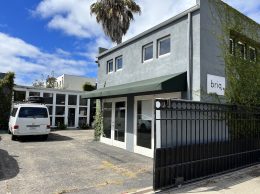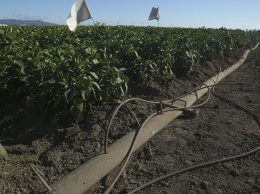Drought forces Pismo Beach to issue building moratorium
IN THIS ARTICLE
- Columns Topic
- pacbiztimes Author
By pacbiztimes Friday, December 11th, 2015

Alex Kacik
The city of Pismo Beach recently issued a tiered building moratorium aimed to conserve water during the state’s historic drought.
The first tier is effective immediately — the city will not issue new building permits. Planning and building permits already in the pipeline will move forward and new planning applications will be accepted. But the construction of new projects on vacant land will be delayed until the city accrues more water. Businesses that look to redevelop property must also show that they will use equal amounts of water or less.
The city recently adopted the tiered system after it missed its 24 percent state-mandated cuts in September and October and expects to receive less state water in 2016.
“It’s becoming such that you can’t ignore the drought and the city will not ignore it,” said Michael Draze, Pismo’s interim community development director. “This is one of the ways to help deal with it.”
Pismo expects a total water supply of approximately 1,337 acre-feet in 2016. It all depends on what the city gets from the State Water Project, Draze said.
If the city’s water supply dips below 1,130 acre-feet and triggers the second tier, officials will not issue building permits even if a project has been approved. Redevelopment of existing buildings must use 15 percent less water and outdoor water use will be prohibited.
The third tier, activated at 850 acre-feet, means redeveloped properties would have to use 30 percent less water.
New applications will still be accepted throughout the process, which is a smart move, said Jeff Eckles of the Homebuilders Association of the Central Coast.
Pismo will evaluate the water supply monthly and change the tiers as necessary.
“If a jurisdiction finds they have to go down this route, the features included with this ordinance are good,” Eckles told the Business Times. “It’s wise that the city will still accept applications and has a monthly review process.”
Most of the Central Coast is meeting the mandated water conservation goals. Given Pismo’s limited available space for buildout and approved permits in the queue, the moratorium will not likely have a major economic impact in the short-term, Draze said.
“Anytime there are restrictions like this on building, there will unintended and undesirable economic consequences,” Eckles said. “But given we’re in the fifth year of this, we have to manage the drought versus the economic benefit of building.”
One of the city’s biggest projects, the 74,000-square-foot, 104-unit Inn at the Pier at 601 Cypress St., is close to receiving its building permit, Draze said.
Cities and counties across the state are grappling with mandatory restrictions and other measures to conserve water.
Gov. Jerry Brown recently issued an executive order that will increase reductions in urban potable water use through October 2016 if the drought persists.
Santa Barbara nixes vacation rentals
Santa Barbara residents will not be able to rent out their homes or open rooms to vacationers for much longer — legally that is.
Technically, using most residences for commercial gain was never legal in Santa Barbara, even though officials previously looked the other way to reap tax revenue. Now, the city will spend money to enforce its shutdown of services like Airbnb and lose out on related transient occupancy tax revenue. The city earned about $1.2 million in TOT from vacation rentals in the 2015 fiscal year.
The Santa Barbara City Council unanimously voted to adopt the planning commission’s recommendation against crafting a homesharing ordinance similar to the city of San Luis Obispo’s.
Enforcing rules on homesharing, which refers to renting out part of a home while the owner is on-site, would be too difficult and invasive, councilmembers said. They cited the city’s housing shortage and the need to preserve the character of the region’s neighborhoods.
The decision means there will likely be fewer tourists spending money at local restaurants and businesses. Residents who abide by the restriction will also have less money to support the local economy.
Airbnb said it works with about 770 hosts in Santa Barbara who earn an average of $9,600 a year. But the city estimates that only a fraction have a business license and pay taxes.
According to Airbnb, the homes on their site only account for 1.4 percent of the city’s total housing stock and the vast majority aren’t full-time, dedicated vacation rentals.
Those in the real estate industry expect short-term renting to continue. More will likely be forced underground.
• Contact Alex Kacik at [email protected].











